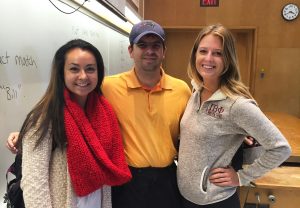Graduate Student Spotlight: Matthew Dube
Matt Dube (Ph.D. Candidate in Spatial Information Science and Engineering in the School of Computing and Information Science) has had a very busy and successful semester. He was recently Faculty of the Month for the month of September from the sisters of the Maine Alpha Chapter of Pi Beta Phi sorority. Matt was recognized for his hard work and dedication to the enrichment of his students, care and concern for them, and also for his acumen as a teacher.

Also, he recently traveled to Santa Fe, New Mexico for the 12th Biannual Conference on Spatial Information Theory (COSIT). In doing so, he became the first graduate student in the history of the conference to be the first author on two papers at the same COSIT. At the previous COSIT, he became one of 22 researchers in the spatial domain to be published in ACM SIGSPATIAL, GIScience, and COSIT, and at this COSIT has become one of even fewer researchers to be first author on papers at these three venues.
On top of his work in the field of spatial informatics, Dube has conducted cutting-edge research in Political Science, around the realm of redistricting. “Determining an Expected House Majority Using Pattern Analysis,” written in conjunction Professor Richard Powell (Political Science) and undergraduate Political Science student Jesse Clark, will be presented at the Northeastern Political Science Association Conference in Philadelphia, Pennsylvania. First of its kind, the paper seeks to find evidence suggesting or refuting impropriety in Congressional redistricting.
Dube has gone further to diversify his academic work by authoring research in the field of veterinary science with Professor Mick Peterson of the Mechanical Engineering department, Professor Robert Causey of the Animal and Veterinary Science department, and other foreign and domestic researchers. The paper under review, entitled “Effects of Turn Geometry and Surface Type on Injury Laterality in Thoroughbred Racehorse Fatalities” explores how the type of surface of the track and its turn size impacts the distribution of injuries amongst the four limbs of racehorses.
He has also been active in Upward Bound Math-Science, a program for first-generation and low income aspiring college students, preparing them for the rigors and trials of academic life. One of his papers, “From Metric to Topology: Determining Relations in Discrete Space,” is the culmination of his mentorship and work with Jordan Barrett, formerly of Oxford Hills Comprehensive High School, and a current undergraduate student at Syracuse University in Mathematics and Physics. Beyond his extensive research mentorship with this program, he also provides mathematics courses ranging from geometry to research statistics.
Beyond his work in the academic realm, Dube has been extensively involved in Alternative Breaks, and serving as the Chapter Counselor for the UMaine chapter of the Sigma Phi Epsilon fraternity. He is also an avid movie enthusiast, a local official for youth and high school sports, and prides himself in fantasy baseball and trivia knowledge.
Matt is currently applying for faculty positions around the United States in Applied Mathematics, Geography, Computer Science, Information Science, and Data Science. More information on his work can be found at http://www.spatial.maine.edu/~matthew.dube.
